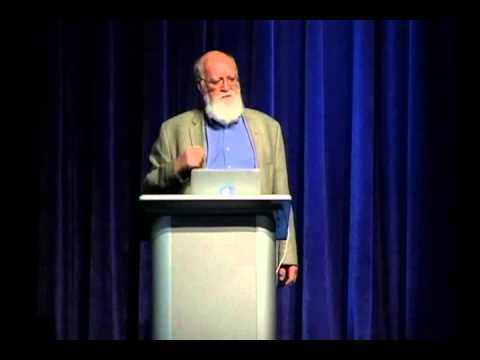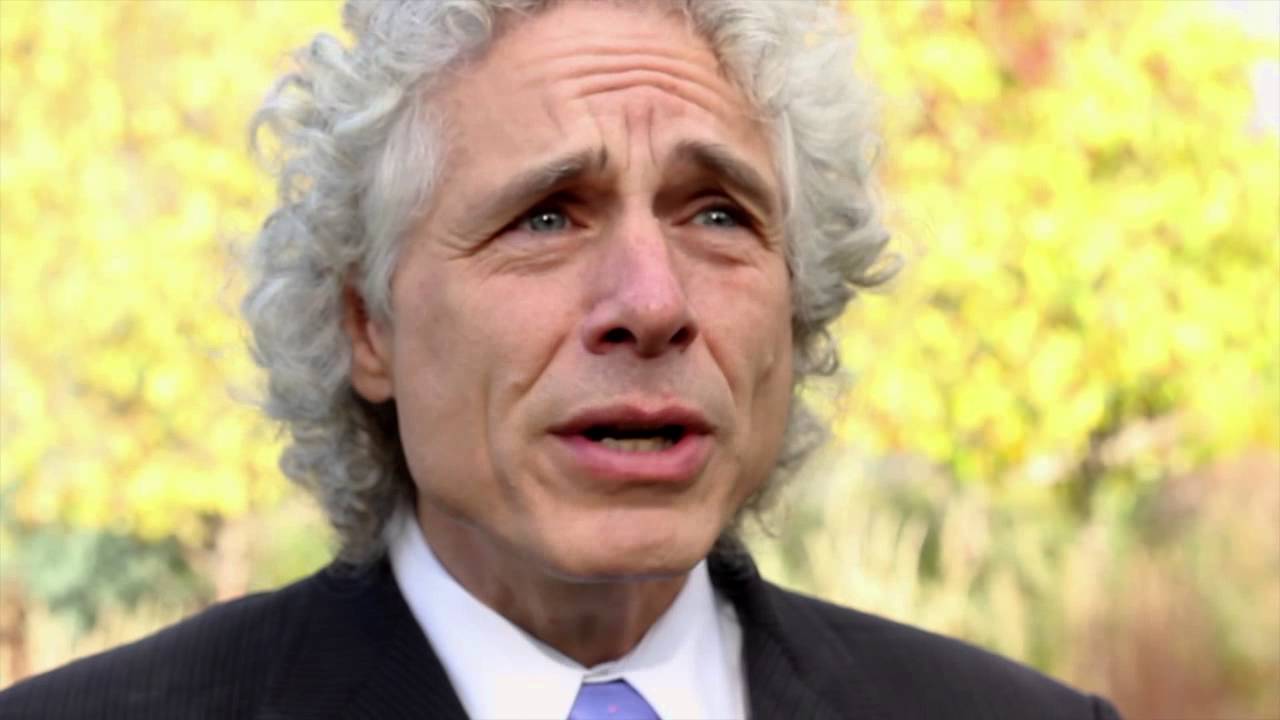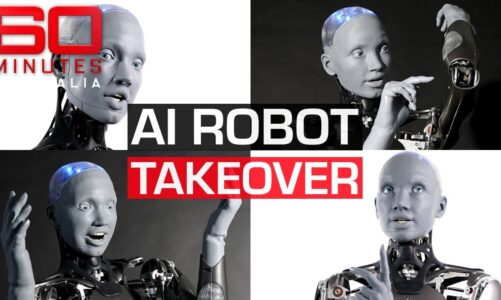Santa Fe Institute
Daniel Dennett
May 14, 2014
Serious thinkers contend that free will cannot exist in a deterministic universe — one in which events are the singular outcomes of the conditions in which they occur. The alternative view, that free will is prerequisite for personal responsibility and morality, is the basis of our legal and religious institutions. Philosopher Daniel Dennett unravels this conundrum and asks whether we must jettison one of these notions, or whether they can co-exist. He then asks: if free will is an illusion, as many scientists say, should we conclude that we don’t need real free will to be responsible for our actions?
Daniel Dennett is the Austin B. Fletcher Professor of Philosophy and Director, Center for Cognitive Studies at Tufts University.
Source




He is being swayed by his personal feelings on free will thus he is not acting freely but in a determined fashion. If only he understood that our crime and punishment society is also acting in a determined fashion in order to limit certain behavior. The argument for the absence of free will does not imply that there should be no punishment as punishment exists in an already determined society, world, universe.
There is free will subjectively and no free will objectively.
The maxim stated around 40 minutes in of keeping your decision-making a secret may be questionable when playing Prisoner's Dilemma repeatedly. That game may be the most
often played game of all in real life. Morality and one's PD strategy are close concepts.
Ask three questions from yourself after waking from a dream.
1. The observer of my dream was conscious or unconscious?
2. The observer of my dream was in my dream or in the universe?
Is the observer of my dream still conscious? If so then where?
Answers of these questions will enable us to understand that there is no free will.
Dan should make it clear that there are two perspectives about "free will." One is relative and the other absolute. The relative takes place within the time/space dimension. From the absolute perspective there is no such thing as free will.
In my opinion as a spiritual person free will absolutely does not exist. Unless you define free will as the ability to make choices, however choices do not occur in a vacuum and therefore are not free choices, they are contingent on previous experience. If one day you decided to step in for a class mate and confront a bully, but on that occasion the bully gave you a horrible beating it is going to affect the next time you see a class mate being bullied.
informative and convincing argument in this presentation & lecture
If you go against your own desires , will, knowledge and daily routines then you probably have free will.
Sorry, Dan, but Sam Harris' arguments are much more convincing and logically sound.
Dan is equivocating free will with free choice. He even explicitly admits that he is changing the definition in order to say that free will exists by showing that something else exists. It is a dishonest bait-and-switch.
There is no such thing as agent causation. Dan is using his silly jokes to appeal to folk psychology. Dan just doesn't want to live in a world where he doesn't have free will. There is something we can call "practical free will" for legal and practical purposes , but as Dan agrees there is no such thing as "ultimate free will". The problem is that the law and moral responsibility were created and exist AS IF "ultimate free will" exists. This is where Compatiablists like Dan Dennett get muddled and confused.
Free will is an illusion. It's a specious concept. It makes no sense; it can never mean what we want it to mean. In a deterministic world, how can there be free will? If the smallest building blocks of everything are identical, isn't everything just a different combination of the same?
It's all about layers of consciousness, or levels of metaawareness. Are you aware of being aware? Depression is a state of brain which often reveals the bleak truth of the world. It's a system that governs itself, like evolution. It keeps on going, correcting anomalies through an interplay of feedback loops. Our "free will" is a result of consciousness, which is just a feedback loop of self reflection. A bunch of machines interacting. Some have more awareness, some have less. Those with the most awareness and least biases/dissonance are probably clinically depressed. I wish I were a child again, just for a day, and then I could die. But alas, then I wouldn't care for dying…
Perhaps there may be even more than one big bang over – and such may only be found on the shores of the last eternity.
What's about some one , has punished doing nothing wrong? Where is the free will from both sides?
If "cognitive science" tells us that free will is an illusion, then cognitive science is a delusion. I am really sick and tired of these overeducated clowns bouncing around the stage in their "academic" costumes.
\][//
"Free will is an illusion" is nonsense, but nonsense is nonsense only when we have not yet found a point of view from which it makes sense.
From the point of view of l who is observable in the universe as an actor, there is a free will but from the point of view of l who is observing the universe, free will is an illusion.
We end up being just spectators of a uniquely interesting movie that is unfolding before us.
What is the absolute truth causality (Cause and Effect circle) of your (valid) Human Nature pattern?
(Ultimately) People don't intend to do wrong to others because even when they do, they are only pursuing their desire for Happiness at whatever cost they understand as fitting (Passion fueled by purpose in choice.).
Selflessly,
Ps. In addition to the misconceptions of truth as opinions/ preferences/ subjective, kindly note: Simple logic says no that time cannot exist without space. Space as an infinite state of being is the perfect essence of actuality (matter/Hope). Time as a state of being is the essence of potentiality (humans/Love). Space (independent constant variable) is the cause of time (dependent constant variable) and they cannot exist without each other. Time is a dependent constant variable because it is in continual motion as a circle and never begins or ends. The following provides support of the empirically logical absolute truth Human Nature pattern as 'Eternal Optimism…
Philosophy is the subject that precedes Science, Math and any other educational subject area (incl. religious studies).
(Facebook was designed to network with people you would never meet with such frequent possibility.)
https://www.facebook.com/notes/eternal-optimism/which-came-first/10152395243605720/
Four Horse-man's failed cause – ~~Darwin~~ Dennett single-handedly screwing-up entire foundation for it.
If there is no personal consequences (punishment) then there is no reason to not kill or do harm. The world would be chaos. Oh hang on, the world is already chaos. ?
Love it when I'm right. If your body is responsible for your choices, our justice system should still punish your body, so there's no changes needed.
Most preoccupations like staying alive, procreate, and other drives, drive us, and once driven, there is no free will.
Once you start to create, be inspired, think of something and realizing it, than there might be free will. Most of the time we do things for status, sex, appraisal, fear, survival and other drives. IOW, there is a drive to keep the body working, without too much pain, and difficulty. Then there is a drive to stop worry, and fear, you fight or flee it, and once the body and mind are sufficiently quieted down, there is space for free will to sprout & develop into something hopefully awesome, which makes people speechless.
Cheers !
You can not choose that which does not occur to you to choose. You do not choose what occurs to you.
Free Will IS and Illusion.
He admits free will does not exist then goes on to say he will ignore it because he doesn't like it…My opinion Sam Harris makes him look foolish.He should lecture on a different topic.
Are there any objective proof that conscious thought have casual effects? Or is confabulation all we have?
AL Gore was #1.
Best thinker.
"Cognitive neuroscience can help us find out who are wired wrong and who are wired right". – wasn't that called the cleansing of the brain in China ?
Mind washing.
By scientists though, so the state is OK to do it.
He contradicts himself.
Great thinker. WOW!
Go back to AL Gore. The best thinker.
Aaaaaaahahaha !
The origin of the big bang is a thought. Thoughts are acts of creations. Yes you can choose another's thought and make it your own, or you can create brand new thoughts. The space of thoughts are infinite. This is why they cannot be determined. An infinite source provides infinite possibilities continuously without ever running out. When you say we don't have free will? what is the "we" made from? One must clarify what the "thing" that has or has no free will made from before you can say anything about if it does have free will or not. So the steps for a viable approach is.
1. What is the definition of free will?
2. What stuff makes the "thing" that I call me?
3. Does that stuff permit free will?
These are my answers to the above
1. What is the definition of fee will.
The ability to change space-time 4 dimensionally, that is change past present and future
2.What stuff makes the "thing" that I call me?
The thing I call me is a single thing that is made of stuff that can connect simultaneous events as is evident from my ability to see simultaneous event.
3. Does that stuff permit free will?
A thing that can connect simultaneous events can operate faster than the speed of light and as such can change past present and future as needed by the definition
https://philpapers.org/rec/DESCAS
The universe is sufficiently complex enough for free will to appear real